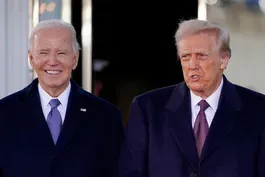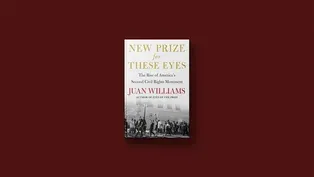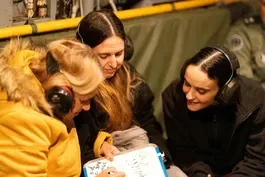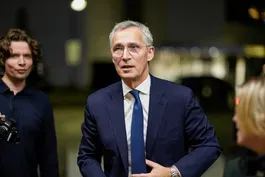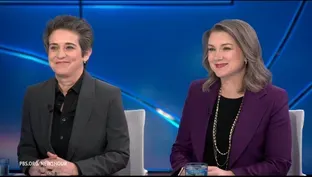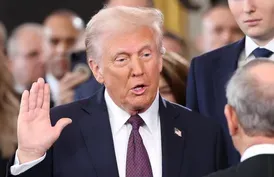
The power of presidential executive orders and their limits
Clip: 1/20/2025 | 4m 29sVideo has Closed Captions
The power of presidential executive orders and their limits
President Trump promised a record number of executive orders on his first day in office. For a closer look at the power of these orders and their limits, Amna Nawaz spoke with Andrew Rudalevige, professor of government at Bowdoin College and author of "The New Imperial Presidency.”
Major corporate funding for the PBS News Hour is provided by BDO, BNSF, Consumer Cellular, American Cruise Lines, and Raymond James. Funding for the PBS NewsHour Weekend is provided by...

The power of presidential executive orders and their limits
Clip: 1/20/2025 | 4m 29sVideo has Closed Captions
President Trump promised a record number of executive orders on his first day in office. For a closer look at the power of these orders and their limits, Amna Nawaz spoke with Andrew Rudalevige, professor of government at Bowdoin College and author of "The New Imperial Presidency.”
How to Watch PBS News Hour
PBS News Hour is available to stream on pbs.org and the free PBS App, available on iPhone, Apple TV, Android TV, Android smartphones, Amazon Fire TV, Amazon Fire Tablet, Roku, Samsung Smart TV, and Vizio.
Providing Support for PBS.org
Learn Moreabout PBS online sponsorshipAMNA NAWAZ: President Trump is expected to issue a record number of executive orders by the end of his first day in office.
For a closer look at the power of these orders and their limits, we're joined by Andrew Rudalevige.
He's professor of government at Bowdoin College and author of "The New Imperial Presidency."
Welcome to the "News Hour."
So, broadly speaking here, just educate us.
What does an executive action give the president authority to do?
How is it different from a law?
ANDREW RUDALEVIGE, Bowdoin College: Well, an executive order or a different kind of presidential directive, there's a whole category of them, basically gives the president the ability to try to implement the law in a way that's consonant with his preferences.
It's part of the power of faithful execution of the law, which is his duty under the Constitution.
And so the power of an executive order does not extend past what the Constitution or an existing statute already allows the president to do.
Obviously, different presidents interpret those earlier statutes differently, and that's one reason you will see shifts in emphasis.
But the power itself is one to implement the law.
AMNA NAWAZ: And do you see these as potentially just being sort of statements of intent, more messaging tools, or do they always actually inspire some sort of immediate action or change?
ANDREW RUDALEVIGE: It's going to be a lot of all of the above, honestly.
Some of them will have immediate impact.
Certainly, revoking President Biden's orders will happen immediately.
If President Trump is making changes to the executive office of the president organizationally.
Declaring emergencies will happen quite quickly, of course.
That's a power Congress has given the president, as was noted.
But others are going to be plans to make plans, right?
Bringing down the cost of living might be something that he directs, but can't happen without a lot of policy change across the whole administration.
Others are going to be effectively press releases, right?
The president saying, I want to do this.
I'm taking action.
I care.
But nothing might happen.
And still others are probably lawsuit bait, really.
The 14th Amendment's promise of birthright citizenship was mentioned earlier, the president has promised to save TikTok, but it's unclear whether that is congruent with the law that's been passed to close it down.
So, again, I think you're going to see a lot of legal challenges, a lot of P.R., and some real action in some kind of proportion.
AMNA NAWAZ: The declaration of a national emergency specifically, as we heard Laura Barron-Lopez reporting earlier, help us understand how that changes the authority that the president has and can enact change on issues like immigration and energy.
ANDREW RUDALEVIGE: Right.
Well, viewers may be surprised to know, but you are living under dozens of national emergencies at the moment.
The National Emergencies Act in the 1970s closed down those that were existing to that point, but allowed the president to declare many others.
And there are laws that govern the way those can be issued, but it's pretty much within the president's purview.
It's worth keeping in mind there doesn't have to be a national emergency for the president to declare one.
So, once one is declared though, different sort of standby powers that are in existing statutes are activated.
So it's a way of unlocking authority that exists already.
If you remember the southern border emergency in President Trump's first term, that allowed him to access some funds for military construction that he could then repurpose to the border wall.
AMNA NAWAZ: And as many presidents have done previously, there's the act of revoking executive orders put into place by previous presidents.
What happens there?
Is the impact of that immediate?
ANDREW RUDALEVIGE: Yes, I mean, again, agencies probably aren't acting too rapidly on 2021 executive orders at this point.
But, yes, I mean, it's -- there's a Housekeeping exercise here where presidents tend to get rid of a lot of their predecessors' orders.
Biden certainly did that.
When he was accused of issuing too many orders, in fact, in 2021, he said, well, actually, I'm just getting rid of old bad ones.
I suspect President Trump will say something similar when he revokes a number of Biden's orders.
AMNA NAWAZ: Andrew Rudalevige, professor of government at Bowdoin College, thank you so much for joining us.
We appreciate your time.
ANDREW RUDALEVIGE: Thank you.
Biden issues preemptive pardons on his way out of office
Video has Closed Captions
Biden issues preemptive pardons on his way out as Trump says he'll pardon Jan. 6 rioters (6m 11s)
'New Prize for These Eyes' details 2nd civil rights movement
Video has Closed Captions
Juan Williams details 2nd civil rights movement in 'New Prize for These Eyes' (7m 31s)
News Wrap: 3 Israeli hostages released as ceasefire holds
Video has Closed Captions
News Wrap: 3 Israeli hostages released as ceasefire appears to be holding (4m 18s)
Stoltenberg on how the world is responding to Trump's return
Video has Closed Captions
Former NATO chief Stoltenberg on how the world is responding to Trump's return (6m 6s)
Tamara Keith and Amy Walter on how Trump changed Washington
Video has Closed Captions
Tamara Keith and Amy Walter on how Trump and Washington have changed since his first term (6m 2s)
Trump returns to office and kickstarts ambitious agenda
Video has Closed Captions
Trump returns to office and kickstarts ambitious and controversial agenda (16m 52s)
Providing Support for PBS.org
Learn Moreabout PBS online sponsorshipMajor corporate funding for the PBS News Hour is provided by BDO, BNSF, Consumer Cellular, American Cruise Lines, and Raymond James. Funding for the PBS NewsHour Weekend is provided by...

